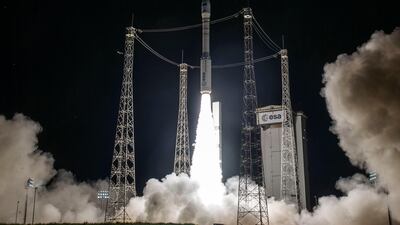The old order of the space race is changing. Where once Nasa, the US space agency, laid claim to nearly 5 per cent of all federal government spending as it sought to win the race to put the first man on the Moon, today the same organisation must make do with a fraction of that budget.
Enter private enterprise to take up the slack. As The National reported yesterday, high net worth individuals are investing their riches in space exploration. Those who could reasonably be called space evangelists include Amazon founder Jeff Bezos, entrepreneur Sir Richard Branson and Elon Musk, the Tesla CEO.
_______________
Read more:
The billionaires backing projects in a new space race
Meet the Falcon that can fly into space at the speed of sound
Genes in Space winner in Florida to witness her idea take off
_______________
If the old order is being disrupted, in part, by the private sector, several members of the international community are also picking up the baton, including the Government of this country. From its Emirates Mars Mission to Khalifa University's Space Lab and the Genes in Space competition, the UAE seeks to engage and inspire through space projects. All being well, teenager Alia Al Mansoori will see her experiment – on how space exposure affects the fitness of live organisms at the molecular level – take off from the Kennedy Space Centre in Florida today.
Others have embarked on similar journeys. India's Space Research Organisation famously sent a mission to Mars in 2014 for less than it cost to make the Hollywood film The Martian. India also effectively proved it was possible to send small and inexpensive satellites into space to address increased demand for telecommunications services.
When the binary race between Nasa and the former Soviet space agency ended a generation ago, many wondered if the space race had also come to a close. Further questions were raised when the space shuttle was retired with no obvious replacement in sight. How wrong those concerns proved to be. Writing in these pages earlier this year, Buzz Aldrin, veteran of the Apollo 11 mission to the Moon, asked: "What's a future for if not to dream big?" Today, the dreams are bigger than ever before. In fact, this may well be the golden age of space exploration.

